| |
Friday, March 7, 2008, 12:46 PM FoodPosted by stefanie Last night, I made kitsune udon for dinner.  Kitsune Kitsune is the Japanese word for "fox." Legend has it that foxes love aburaage, or deep-fried sheets of tofu, hence the name. I think it's because the triangles of aburaage look like fox ears in the bowl. That's tofu-ya aburaage, by the way. Doesn't it look amazing?
Karaoke: Competition and Workout
Wednesday, March 5, 2008, 8:45 PM Strange JapanPosted by stefanie We've experienced karaoke in Japan enough times now to think that it's substantively different from karaoke in America. In America, it seems that people usually do it as an ironic or goofy thing. Here, it's a sincere form of entertainment. Or possibly sport ¡½ people practice, and some systems have scoring based on rhythm and pitch. Most of our Japanese friends do quite well, scoring in the 75% - 90% range. We're not that good; maybe we need more practice within our respective repertoires (Matthew prefers punk and rock; my specialties are Britpop and Songs Clay Aiken Performed on American Idol.). Or maybe we need repertoires of Japanese songs to be competitive. Karaoke isn't just a competition, it's also a workout. At the end of each song, some systems tell you the number of calories burned performing it. We're not sure how accurate the calorie count is, though. For example, one system claims that a midtempo Japanese enka song uses more energy than the Offspring's "Why Don't You Get A Job?" On the other hand, it's good to know that karaoke has health benefits beyond making one's life a bit happier, and since I can't Jazzercise in Kitakami, maybe it's the next best thing.
The colorfully lit street of vendors at Inukko Matsuri. 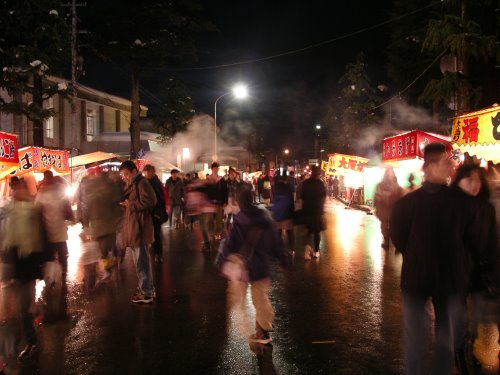
A few weeks ago, our friendly local liquor store owner / school landlord invited us to take a tour and tasting at a local sake brewery, Kikuzakari. It's a small brewery that has been in the same family for generations. The current president is the founder's great-great grandson, and he took us on the tour personally. One thing that's obvious when you tour a sake brewery is that OSHA holds no sway here. Workplace safety is your own lookout. Even customers taking a tour are expected to look out for themselves, walking about in poor lighting on wet floors, stepping over the hoses and wires strewn everywhere. 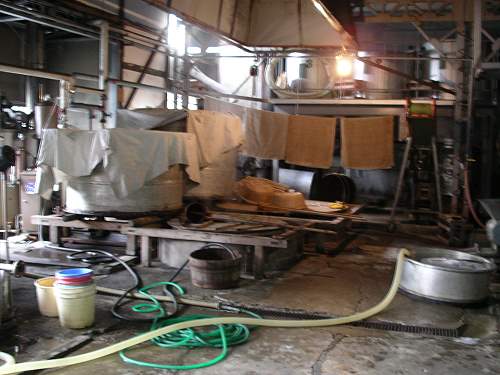 Of course, it was well worth it just to get to spend time surrounded by the yummy yeasty smell of brewing alcohol. It was heavenly. At one point we got to try the somewhat sweet and tart raw sake from a vat that was just about ready for filtering and bottling. Being a small brewery, many tasks that would be done by machine at a large brewery are done by hand. The day we were there, this guy was gluing the labels to the bottles. It's not a very exciting job — grab a crate, wipe all the bottles clean, spread glue on a label, carefully line it up and press it in place, move on to the next bottle — but I guess somebody has to do it. 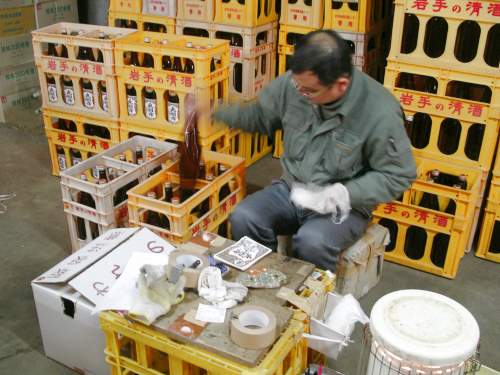
Spring is coming. Now we sometimes get rain instead of snow, and most days the weather goes above freezing. And soon, photos like this will just be a reminder of what to expect again next winter. 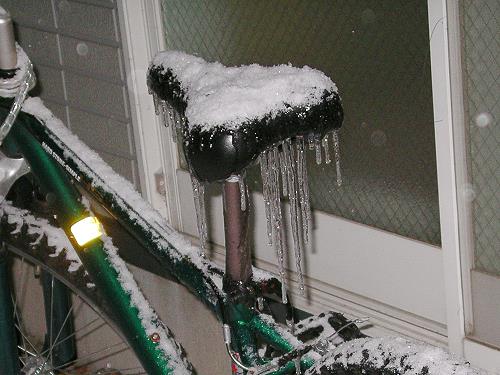
Tuesday, February 26, 2008, 9:02 PM Strange JapanPosted by stefanie One of my childhood neighbors died recently, giving me occasion to go shopping for a sympathy card. I stood at the very small greeting card display in our local stationery store for a good while before I concluded that they had no sympathy cards. Not that they had run out, but that they simply didn't carry them. Prior to then, it hadn't occurred to me that the Japanese wouldn't send sympathy cards upon someone's death, but that appeared to be the case. I asked some of my students about it later, and was quite surprised by their answer. We've never heard of sympathy cards, they said. We send telegrams when people die.
Telegrams? The things Western Union stopped sending about two years ago because technology had rendered them obsolete? As it turns out, telegrams are used frequently in Japan to acknowledge major life events. Deaths, births, marriages, retirements ¡½ all are occasions for telegrams. You can even choose special papers for your messages or stuffed animals to accompany them. And, ironically, you can order them on the internet.
[ 1 comment ] permalink
Monday, February 25, 2008, 12:34 PM Strange JapanPosted by matthew It's always amusing to see English — and made-up "English" words — in Japanese brand names and advertising. They mean well, but often miss the connotations of the English they choose. For example, there is a line of car accessories called "Blang". My reaction? "Past tense? What is that, like last year's style?" It's actually a pretty neat word, but alas, I was not the first to think of it.
Friday, February 22, 2008, 8:34 PM Strange JapanPosted by stefanie Parking in Japan (well, in Kitakami anyway) is an interesting thing. There are lots and garages, of course, but these seem to be mostly used for daily parking or at shopping centers. There aren't meters anywhere, which sort of makes sense if you consider that streets here are quite narrow ¡½ why invite people to clog the space available for traffic to flow? The lack of meters isn't a deterrent, though. It's common practice to simply pull over to the curb and leave your car there while you run into the store to take care of business. Everyone just drives around you.
For someone used to restrictions on on-street parking, this just seems kind of wrong. In fact, I avoided doing it for the first couple of months that we had the car because I felt like kind of a jerk doing it. "I'm just leaving my car here in the road while I get the dry cleaning! Yes, I know the road is one-and-a-half lanes wide, but just go around!" Now that I'm used to it, I kind of like it. Everyone knows that's what you do, so no one's trying to run you over, giving you the stinkeye, and/or honking at you. And it's nice to be able to stash the car and run a quick errand without hunting for parking.
The random car-leaving is especially interesting in light of the fact that to even own a car in Japan, you must prove that you have a place to park it. You have to tell the dealer where your space is, then he has to provide details about the space, like location, to the police so that they can verify that it is, in fact, your space. Only then can you actually buy the car. So, once you've proven that you have a place to park your car, you can . . . park it anywhere you like.
[ 3 comments ] permalink
Thursday, February 21, 2008, 1:59 PM GeneralPosted by stefanie Winter festivals are quite popular in Tohoku, especially in places like Hokkaido and Akita, where a lot of snow falls. On Saturday, we went to the festival of Kamakura in Yokote, Akita Prefecture. Kamakura are huts made out of piles of hollowed-out snow. Inside the large ones, there are altars to honor the water god. People present offerings of sake, mikan, and rice cakes and ask for plentiful rain during the planting season. At night, local children sit inside the kamakura and invite passersby in to eat grilled mochi and drink amazake. It's a very happy thing to walk among the community of snow huts and chat with the children inside. We started our day with a visit to Yokote Castle. The path to the castle was lined with unlit kamakura. 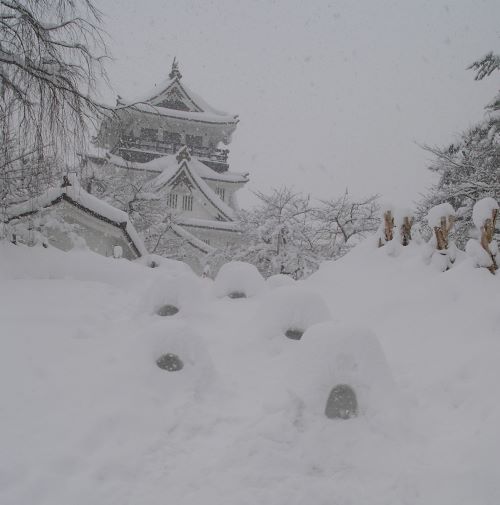 The festival really got underway after dark, when the candles could be lit, making the kamakura glow. 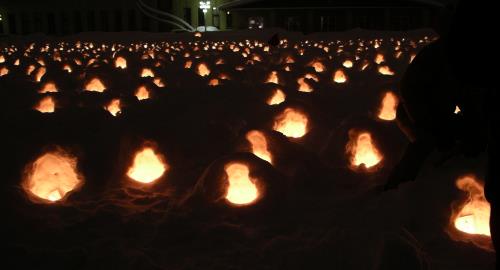 Of course, we accepted an invitation for mochi and amazake. 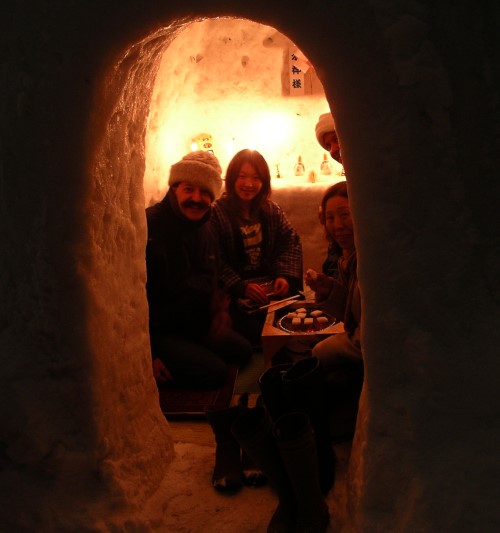 Even for a kamakura, you have to take your boots off in the genkan ¡½ you don't want to get snow on the blankets lining the floor.
Tuesday, February 19, 2008, 1:07 PM GeneralPosted by stefanie I turn 33 this June. According to the Japanese age system, I'm already there and therefore in need of protection. For women, 33 is a major yakudoshi, or "age of calamity," as one reading of the number 33, san-zan, means "horrible" or "difficult." (For men, the age of major calamity is 42 because one reading of the number, shi-ni, is a homophone for the Japanese word for "death.") The year before ( maeyaku) and the year after ( atoyaku) one's yakudoshi are also unlucky years. So basically, the most unlucky years of my life span the entire time we're living in Japan. Awesome. My yakudoshi luck made itself apparent at noon on Sunday. A few weeks ago, I had signed up to participate in our area shrine's yakudoshi ceremony. Two hours before the ceremony, a couple of the community leaders came to the house with the following explanation for how things would go down: "You'll be first because you're the only thirty-three-year-old. Also, and we're really, really sorry for the late notice, but could you give a speech? It can be easy! We're really sorry to tell you this now. Thank you so much. Did we mention that we're sorry about springing this on you two hours before the ceremony?" One frenzied phone call to my Japanese teacher and a consultation with the neighbors across the street later, I had a short, sweet speech prepared. At the ceremony, a Shinto priest prayed for the good health and fortune of the people celebrating their yakudoshi.  Members of the community gave those of us participating in the ceremony red hats after the blessing. 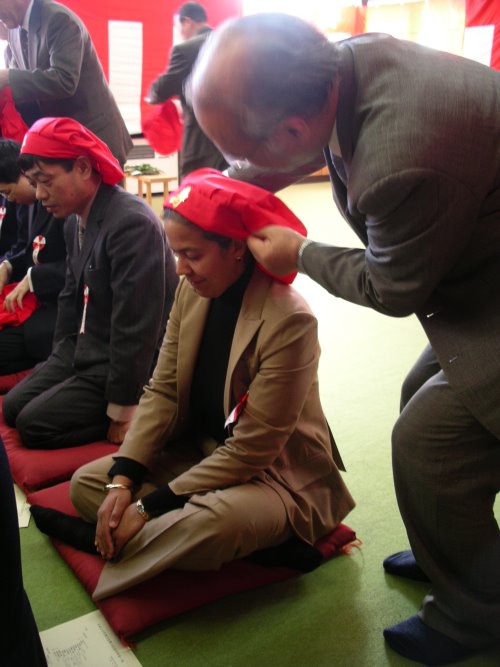 Once the ceremony had concluded, the community members and celebrants had a party with lots of drinking, eating, and well-wishing. My speech went very smoothly, perhaps helped along by the well-wishers plying me with beer. The community leaders made the forty-two-year-olds and me (and Matthew, just for kicks) dance a traditional dance. 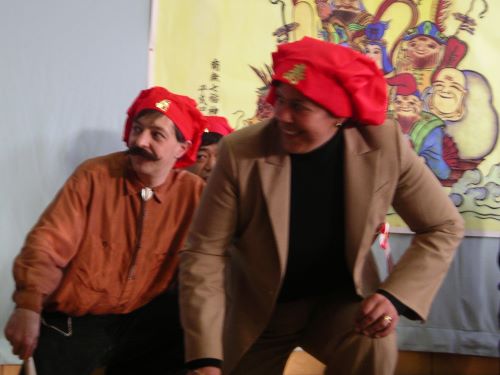 It was a very special day, and we had a great time.
Back Next
|
|












 Calendar
Calendar




